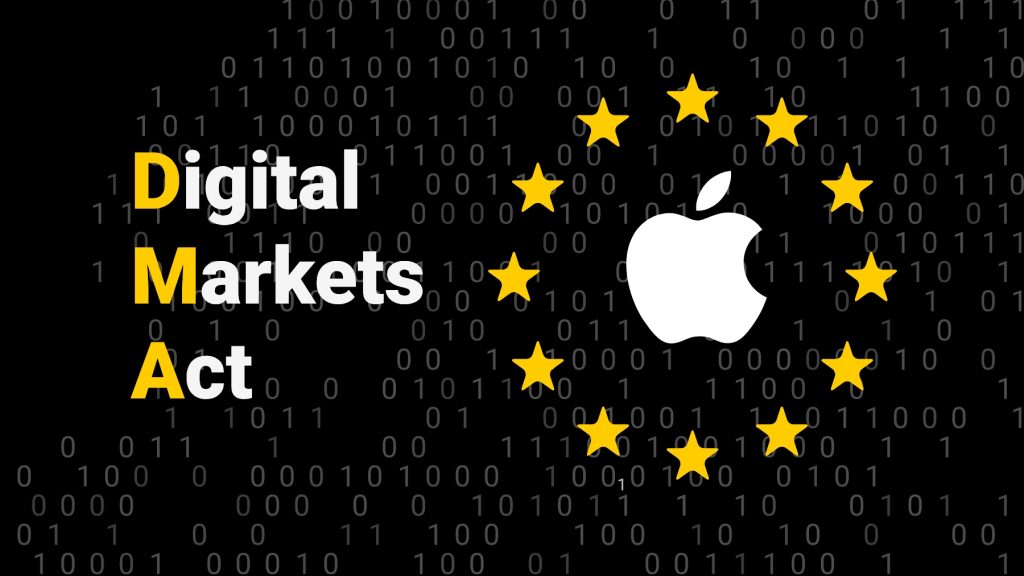
In compliance with the EU’s Digital Markets Acts, Apple had to modify iPhone features to meet the March 2024 deadline.
- The DMA targets Big Tech companies, including Apple, to regulate and foster fair competition in the digital market within the EU.
- Apple addresses the EU’s concerns regarding app distribution, commissions, limited user control, and data lock-in by implementing various changes in iOS 17.4.
The European Union’s Digital Markets Act (DMA) has officially gone into effect this week, and Apple seems to have some tricks up its sleeve still.
Way back in 2020, the European Commission proposed the Digital Markets Act (DMA) and the Digital Service Act (DSA). The DMA painted a humongous bullseye on Big Tech companies. Alphabet, Amazon, Apple, ByteDance, Meta, and Microsoft were thus dubbed gatekeepers. Each has large online platforms with no less than 45 million monthly active users within the EU. It’s the EU’s way of regulating and fostering fairer competition in the digital market. March 6 was the compliance deadline for the six gatekeepers. They were to adhere to the full list of regulations. Let’s see how Apple did, shall we?
The EU concluded that for iPhone users to access and participate in the online world, they have to go through the iOS App Store and the Safari browser. The EU had four big bones to pick with Apple.
One, sideloading. Sideloading refers to downloading an app from sources other than the official app store. On Android, you can download an app from both its official website and the app store of your choice. In Apple’s case, however, that was a big red NO, under the pretext of safety.
Two, the commissions. Apple receives a hefty commission for most App Store purchases. The EU viewed this as excessive and unfair, as it could potentially lead to inflated app prices for users and reduced profits for developers, especially smaller ones.
Three, limited user control. Despite you purchasing the phone, the phone itself dictates exactly what you can do. Apple’s pre-installed apps and default settings, like Safari being the default browser, restricted user choice and limited their ability to personalize their experience.
And four, data lock-in. Apple’s closed ecosystem (or, as our editor-in-chief likes to refer to it, the walled garden) makes it difficult for users to transfer their data (like app data or subscriptions) to other services. So, if an iPhone user wants to upgrade their phone, they either get another iPhone or go through the very tedious and mind-numbing process of transferring the data from the iPhone to their new Android.
One thing I want to clear up. Interoperability is not just an Apple problem. Big Tech companies don’t know how to play nice with others all that well. Apple is just very aggressive about it.
So, what did Apple do to comply?
Apple decided to play nice. According to the document detailing its compliance:
- Starting with iOS 17.4, Apple allows developers to distribute apps through alternative app marketplaces besides the official App Store in the EU.
- When opening Safari for the first time on iOS 17.4, users see a screen offering a choice of default web browsers available in the user’s region.
- Users can choose their preferred app store (like a third-party alternative) through a new setting. Features like app search in Spotlight will integrate with the chosen marketplace.
- Users can select their preferred contactless payment app (like Google Pay or Apple Pay) for transactions.
- Apple plans to allow the complete deletion of Safari from iOS by the end of 2024.
- Developers in the EU can now offer alternative payment methods within their apps alongside Apple’s In-App Purchase (IAP) system.
And a couple more things. To no one’s surprise, Apple stressed again and again that going down the road that is not exclusively Apple’s may risk your security. Also, for everything that Apple granted, it required more:
- Developers have to agree to specific terms set by Apple (Alternative EU Terms Addendum).
- Apple has to approve the alternative app marketplaces through a specific program.
- The alternative app marketplaces are responsible for their own security, content moderation, user experience, and customer support.
- The alternative app marketplaces must comply with Apple’s Notarization process (security checks) for apps.
- Developers need to request special permission from Apple (Web Browser Engine Entitlement or Embedded Browser Engine Entitlement).
- Developers must Enroll in the Alternative EU Terms Addendum program.
- Developers Report transactions to Apple and pay a commission on sales.
On top of that, we are starting to notice drawbacks. It turns out that if you leave the EU for longer than 30 days, Apple will retract your third-party app store privileges faster than you can blink. Will these changes to the iPhone appease the EU for the remainder of 2024?
The company wrote on its website, “Alternative app marketplaces can continue updating those apps for up to 30 days after you leave the European Union, and you can continue using alternative app marketplaces to manage previously installed apps.”
The EU wanted to rectify being an absent parent to Big Tech through the DMA. However, Apple has always and will always look out for itself. From the looks of it now, what was meant to reel it in backfired. There are now more hoops to jump through to go the non-Apple way.
People will almost always pick the path of least resistance.
Inside Telecom provides you with an extensive list of content covering all aspects of the tech industry. Keep an eye on our Tech sections to stay informed and up-to-date with our daily articles.